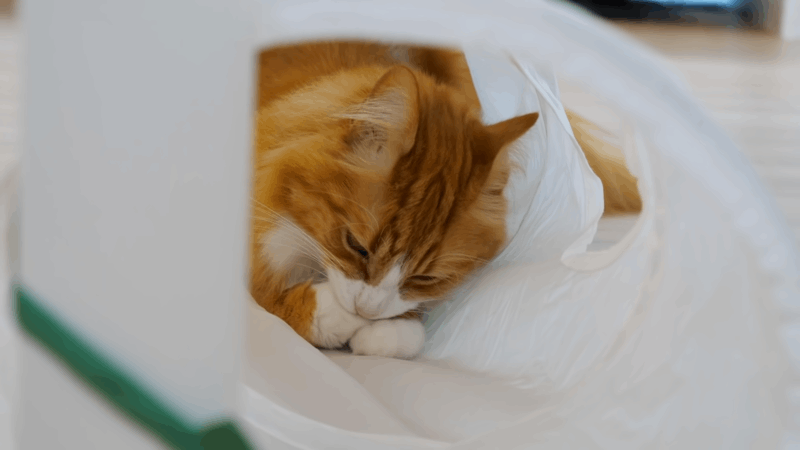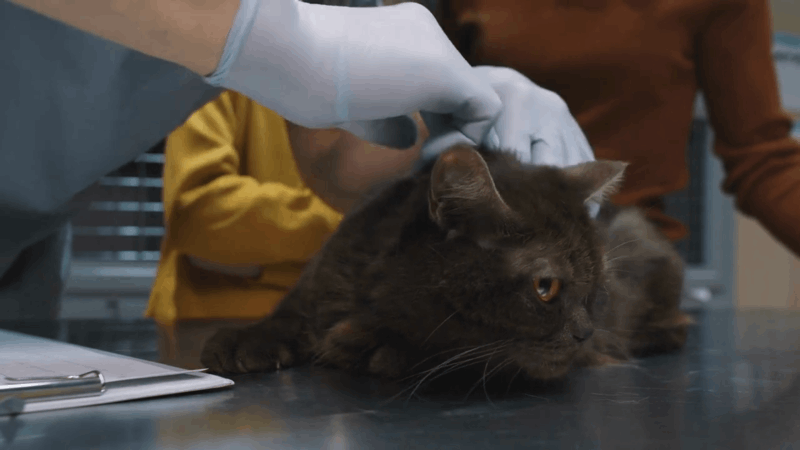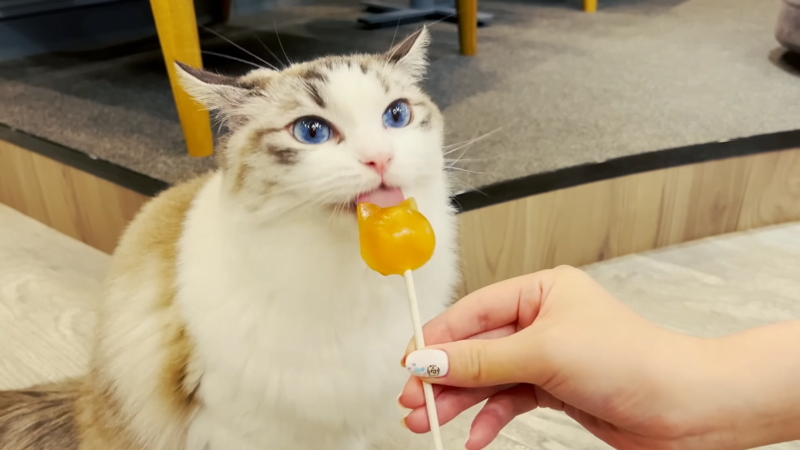No products in the cart.
CBD and inflammation in cats have emerged as a potential natural remedy worth exploring. With its interaction with the cat’s endocannabinoid system and its ability to target inflammatory pathways, CBD shows promise in reducing inflammation and alleviating associated symptoms in our feline companions. In this blog, we will discover the topics of CBD and inflammation in cats, is CBD good for cats with inflammation, does CBD help with inflammation, and how does CBD reduce inflammation.
CBD and Inflammation in Cats
CBD (cannabidiol) has shown potential as a natural remedy for inflammation in cats. It interacts with the body’s endocannabinoid system (ECS), which controls several physiological processes, including inflammation. CBD has anti-inflammatory properties that can help reduce inflammation and alleviate associated symptoms in cats. It may be used as a complementary approach alongside other veterinary treatments. You can find more amazing CBD products for pets at Pet CBD Club.

What Is Inflammation in Cats?
Cats’ immune systems react biologically to injury, infection or irritation by inducing inflammation. It is distinguished by pain, heat, swelling, and redness in the affected area. The body uses inflammation as a means of defense and self-healing. However, if it persists or is overdone, it can cause cats to develop several medical issues.
Common Health Conditions Associated With Cat Inflammation
Cats can experience inflammation in different parts of their bodies. Some common health conditions associated with inflammation in cats include:
- Cat Arthritis: This inflammatory condition brings about painful sensations, stiffness, and swelling. Typically, older felines are more prone to experiencing it, which can subsequently hinder their mobility.
- Dental Disease: Gingivitis, periodontal disease, and other dental issues can inflame a cat’s mouth. Inflamed gums, tooth decay, and oral infections are common manifestations.
- Cat Allergies: Cats can become allergic to pollen, dust mites, specific foods, or fleas, among other things. Allergies can cause respiratory symptoms like coughing or wheezing in cats. They can also cause skin rashes and itching in our lovely friends.
- Cat Upper Respiratory Infections: Viral or bacterial infections like feline herpesvirus or calicivirus can cause inflammation in the respiratory system. Sneezing, nasal discharge, coughing, and itchy eyes are just a few symptoms that could appear.
- Cat Urinary Tract Infections: Cats can develop inflammation of the urinary tract, which includes the bladder and urethra. Frequent urination, straining to urinate, blood in the urine, and pain or discomfort are typical warning symptoms.
- Skin Infections: Inflammation and discomfort can result from bacterial or fungal skin diseases. You can notice symptoms like redness, swelling, tenderness, and warmth in the affected area of your cat. Your cats may feel uncomfortable and itchy, leading to scratching or excessive grooming of the affected skin.
Differentiating Between Acute and Chronic Inflammation in Cats
Cats can experience acute and chronic inflammation. Here’s how they can be differentiated:
Acute Inflammation:
- Duration: Acute inflammation is a swift and temporary reaction that occurs shortly after an injury, infection, or exposure to an irritant.
- Onset: It typically develops quickly, often within minutes or hours.
- Symptoms: Redness, swelling, heat, pain, and functional impairment in the affected area are typical signs of acute inflammation in cats.
- Purpose: Acute inflammation is a protective response aimed at removing harmful stimuli and initiating the healing process.
- Resolution: In most cases, acute inflammation subsides within a few days or weeks as the underlying cause is addressed and the healing process progresses.
Chronic Inflammation:
- Duration: Chronic inflammation can last for weeks, months, or even years in a cat’s body.
- Onset: It may develop gradually over time or result from a failure to resolve acute inflammation.
- Symptoms: Cats may experience a variety of symptoms of chronic inflammation, such as inflammation, tissue damage, and scarring.
- Purpose: Unlike acute inflammation, chronic inflammation is often considered a pathological response that can cause ongoing tissue damage.
Underlying conditions: Chronic inflammation can be associated with underlying conditions such as autoimmune disorders, persistent infections, or prolonged exposure to irritants.
Is CBD Good for Cats With Inflammation?
CBD (cannabidiol) has become well-known for its potential anti-inflammatory properties in humans, and some pet owners have also turned to CBD products for their cats. CBD has shown potential for reducing inflammation in various studies and anecdotal reports. In both human and animal tests. It’s crucial to remember that additional research is required to properly comprehend the efficacy of CBD and its specialized uses for various forms of inflammation.

What Is CBD for Inflammation in Cats?
CBD for inflammation in cats refers to the use of cannabidiol, a compound derived from the cannabis plant, as a potential natural remedy for reducing inflammation in feline companions. CBD interacts with the cat’s endocannabinoid system, which regulates various physiological processes, including inflammation. By targeting inflammatory pathways, CBD may help alleviate inflammation and associated symptoms in cats.
Inflammation Impacts on Cats’ Health
Inflammation in cats is the body’s response to injury, infection, or irritation. It is a normal protective mechanism that aims to remove harmful stimuli and initiate the healing process. However, chronic or excessive inflammation can negatively impact a cat’s health. It can harm tissue, be uncomfortable, and lead to other health issues. It can aggravate conditions including arthritis, dermatitis, urinary tract issues, and gastrointestinal disorders.
CBD and Its Potential Role in Inflammation Management in Cats
CBD has shown promise as a potential natural remedy for managing inflammation in cats. By targeting inflammatory pathways, CBD may help reduce inflammation and alleviate associated symptoms in cats. However, it’s crucial to speak with a vet to establish the right dosage and guarantee the safety and efficacy of CBD for your cat’s particular illness.
Safety and Side Effects of CBD on Cats With Inflammation
Despite the fact that CBD is frequently believed to be healthy for cats, it is essential to utilize it with caution and with a veterinarian’s consent. Sedation, changes in appetite, and minor gastrointestinal distress are typical adverse effects of CBD in cats. It’s crucial to start with a low dose and monitor your cat’s response closely. Additionally, ensure that you use high-quality CBD products specifically formulated for cats and avoid products with THC, as it can be toxic to cats. Consulting with a veterinarian is important to ensure the safety and proper usage of CBD for your cat.
Does CBD Help With Inflammation?
CBD may modulate immune responses and inhibit the production of inflammatory compounds. According to several studies, CBD can lessen inflammation in some illnesses. Before considering using CBD for inflammation, it is advised to get individualized advice from a medical practitioner or veterinarian.

Effectiveness of CBD in Addressing Inflammation in Cats
Based on variables like the cat’s unique response, the degree of inflammation, and the cat’s specific health condition, CBD’s efficacy for treating inflammation in cats can vary. While some cat owners have reported positive outcomes in reducing inflammation and related symptoms with CBD, additional research is necessary to comprehensively understand its effectiveness and the best ways to use it for feline inflammatory conditions. Seeking advice from a veterinarian is essential to determining the appropriate dosage and usage for your cat’s specific requirements.
CBD Reducing Pain and Inflammation Symptoms in Cats
CBD for cats pain may help reduce pain and inflammation symptoms in cats. By interacting with the endocannabinoid system, CBD can modulate pain perception and help alleviate discomfort associated with inflammation. It may also help reduce swelling and improve mobility in cats with conditions such as arthritis. However, the extent of pain and inflammation relief can vary among individual cats, and it’s important to closely monitor their response and consult with a veterinarian for proper management.
Factors to Consider When Using CBD for Inflammation in Cats
When using CBD for inflammation in cats, several factors should be considered:
- Dosage: Determining the appropriate dosage for cats is crucial. Cats may require lower doses compared to humans or dogs. To determine the appropriate dosage for the unique condition and size of your cat, speaking with a veterinarian is imperative.
- Quality and sourcing: Choose high-quality CBD products specifically formulated for cats. Ensure that the CBD is derived from reputable sources and undergoes third-party testing for purity and potency.
- Product formulation: Consider the different forms of CBD administration, such as oils, treats, or topicals, and choose the most suitable option for your cat’s needs and preferences.
- Safety: CBD is typically safe for cats, but it’s still vital to be aware of any effects and pay close attention to how your cat responds. Every cat is unique, so it’s important to observe how your furry friend responds to CBD and adjust accordingly.
Other medications and conditions: Inform your veterinarian about any other medications or health conditions your cat may have, as CBD may interact with certain medications or require adjustments in treatment plans.
How Does CBD Reduce Inflammation?
CBD (cannabidiol) has the potential to reduce inflammation through various mechanisms in the body. While the exact mechanisms are still being studied, here are some ways CBD may help reduce inflammation:
- Inhibiting inflammatory pathways: CBD has been found to inhibit specific pathways involved in inflammation. It can suppress the production of inflammatory molecules and enzymes, thereby reducing the overall inflammatory response.
- Anti-oxidative effects: CBD exhibits antioxidant properties, which can help reduce oxidative stress and inflammation. By neutralizing harmful free radicals, CBD may help mitigate inflammation caused by oxidative damage.
- Pain relief: Inflammation often leads to pain. It has been demonstrated that CBD possesses analgesic (pain-relieving) qualities, which can help ease the discomfort brought on by inflammation.

Natural Alternative Products for Managing Inflammation
Several natural alternative products can help manage inflammation in cats. Some of these include:
- Omega-3 fatty acids: Omega-3 fatty acids, found in fish oil supplements, have a vital role in regulating inflammation within the body. When cats consume these supplements, the omega-3 fatty acids are absorbed and integrated into their cell membranes.
- Turmeric: Turmeric contains curcumin, which has anti-inflammatory effects. It can be added to a cat’s diet or used in supplement form.
- Herbal remedies: Certain herbs like Boswellia, ginger, and yucca have anti-inflammatory properties and may be used as supplements or included in cat food formulations.
- Probiotics: Probiotics can aid with gut health and reduce digestive system inflammation, which can indirectly affect the overall levels of inflammation in cats.
To make sure any natural products are safe for your cat and suited for the cat’s situation, it’s crucial to speak with a veterinarian before using them.
Tips to Reduce Inflammation in Cats
- Provide a nutritious diet: Feeding your cat a high-quality, balanced diet can support their overall health and help reduce the symptoms. Choose cat food that contains quality protein sources, healthy fats, and limited artificial additives.
- Maintain a healthy weight: Obesity can contribute to inflammation, so it’s important to ensure your cat maintains a healthy weight through portion control and regular exercise.
- Manage stress: Stress and anxiety can exacerbate inflammation in cats. Consider using items or methods that encourage relaxation, like pheromone diffusers or interactive toys, to create a quiet and stress-free atmosphere for your cat.
- Regular veterinary check-ups: Regular veterinary examinations can assist in identifying and managing any underlying medical issues that could be responsible for inflammation. Follow your veterinarian’s advice regarding vaccinations, preventive care, and treatment plans.
- Environmental factors: Reduce your cat’s exposure to environmental irritants or allergies such as smoke, dust, and some cleaning chemicals.
Conclusion
CBD has shown potential as a natural remedy for inflammation in cats. By interacting with the endocannabinoid system and targeting inflammatory pathways, CBD may help reduce inflammation and alleviate associated symptoms. However, to ensure the best approach for your furry friend, it’s crucial to consult with a veterinarian who can provide personalized advice and guidance.
I am Nelson Cooper, I pursue my passion for writing and my belief is that cats love humans. I enjoy traveling and have a deep appreciation for the beauty of nature, as well as a soft spot for animals, particularly cats.



